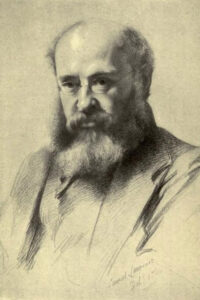
Ayala’s Angel
We must begin yet a little earlier and say that there had been,—and had died many years before the death of Egbert Dormer,—a clerk in the Admiralty, by the name Reginald Dosett, who, and whose wife, had been conspicuous for personal beauty. Their charms were gone, but the records of them had been left in various grandchildren. There had been a son born to Mr. Dosett, who was also a Reginald and a clerk in the Admiralty, and who also, in his turn, had been a handsome man. With him, in his decadence, the reader will become acquainted. There were also two daughters, whose reputation for perfect feminine beauty had never been contested. The elder had married a city man of wealth,—of wealth when he married her, but who had become enormously wealthy by the time of our story. He had when he married been simply Mister, but was now Sir Thomas Tringle, Baronet, and was senior partner in the great firm of Travers and Treason. Of Traverses and Treasons, there were none left in these days, and Mr. Tringle was supposed to manipulate all the millions with which the great firm in Lombard Street was concerned. He had married old Mr. Dosett’s eldest daughter, Emmeline, who was now Lady Tringle, with a house at the top of Queen’s Gate, rented at £1,500 a year, with a palatial moor in Scotland, with a seat in Sussex, and as many carriages and horses as would suit an archduchess. Lady Tringle had everything in the world; a son, two daughters, and an open-handed stout husband, who was said to have told her that money was a matter of no consideration.
The second Miss Dosett, Adelaide Dosett, who had been considerably younger than her sister, had insisted upon giving herself to Egbert Dormer, the artist, whose death we commemorated in our first line. But she had died before her husband. They who remembered the two Miss Dosetts as girls were wont to declare that, though Lady Tringle might, perhaps, have had the advantage in the perfection of feature and unequaled symmetry, Adelaide had been the more attractive from expression and brilliancy. To her Lord Sizes had offered his hand and coronet, promising to abandon for her sake all the haunts of his matured life. To her, Mr. Tringle had knelt before he had taken the elder sister. For her Mr. Program, the popular preacher of the day, for a time so totally lost himself that he was nearly minded to go over to Rome. She was said to have had offers from a widowed Lord Chancellor and a Russian prince. Her triumphs would have quite obliterated that of her sister had she not insisted on marrying Egbert Dormer.
Read or download Book
Anthony Trollope
Anthony Trollope (24 April 1815 – 6 December 1882) was an English novelist and civil servant of the Victorian era. Among his best-known works is a series of novels collectively known as the Chronicles of Barsetshire, which revolves around the imaginary county of Barsetshire. He also wrote novels on political, social, and gender issues and other topical matters. Trollope’s literary reputation dipped during the last years of his life, but he regained somewhat of a following by the mid-20th century.
Biography
Anthony Trollope was the son of barrister Thomas Anthony Trollope and the novelist and travel writer Frances Milton Trollope. Though a clever and well-educated man and a Fellow of New College, Oxford, Thomas Trollope failed at the Bar due to his bad temper. Ventures into farming proved unprofitable, and he did not receive an expected inheritance when an elderly childless uncle[a] remarried and had children. Thomas Trollope was the son of Rev. (Thomas) Anthony Trollope, rector of Cottered, Hertfordshire, himself the sixth son of Sir Thomas Trollope, 4th Baronet. The baronetcy later came to descendants of Anthony Trollope’s second son, Frederic. As a son of the landed gentry, Thomas Trollope wanted his sons to be raised as gentlemen and to attend Oxford or Cambridge. Anthony Trollope suffered much misery in his boyhood owing to the disparity between the privileged background of his parents and their comparatively small means.
Born in London, Anthony attended Harrow School as a free day pupil for three years from the age of seven because his father’s farm, acquired for that reason, lay in that neighborhood. After a spell at a private school at Sunbury, he followed his father and two older brothers to Winchester College, where he remained for three years. He returned to Harrow as a day boy to reduce the cost of his education. Trollope had some very miserable experiences at these two public schools. They ranked as two of the élite schools in England, but Trollope had no money and no friends and was bullied a great deal. At the age of 12, he fantasized about suicide. He also daydreamed, constructing elaborate imaginary worlds.
In 1827, his mother Frances Trollope moved to America with Trollope’s three younger siblings, to Nashoba Commune. After that failed, she opened a bazaar in Cincinnati, which proved unsuccessful. Thomas Trollope joined them for a short time before returning to the farm at Harrow, but Anthony stayed in England throughout. His mother returned in 1831 and rapidly made a name for herself as a writer, soon earning a good income. His father’s affairs, however, went from bad to worse. He gave up his legal practice entirely and failed to make enough income from farming to pay rent to his landlord, Lord Northwick. In 1834, he fled to Belgium to avoid arrest for debt. The whole family moved to a house near Bruges, where they lived entirely on Frances’s earnings.
In Belgium, Anthony was offered a commission in an Austrian cavalry regiment. To accept it, he needed to learn French and German; he had a year in which to acquire these languages. To learn them without expense to himself and his family, he took a position as an usher (assistant master) in a school in Brussels, which position made him the tutor of 30 boys. After six weeks of this, however, he received an offer of a clerkship in the General Post Office, obtained through a family friend. He returned to London in the autumn of 1834 to take up this post. Thomas Trollope died the following year.
According to Trollope, “the first seven years of my official life were neither creditable to myself nor useful to the public service.” At the Post Office, he acquired a reputation for unpunctuality and insubordination. A debt of £12 to a tailor fell into the hands of a moneylender and grew to over £200; the lender regularly visited Trollope at his work to demand payments. Trollope hated his work but saw no alternative and lived in constant fear of dismissal.






